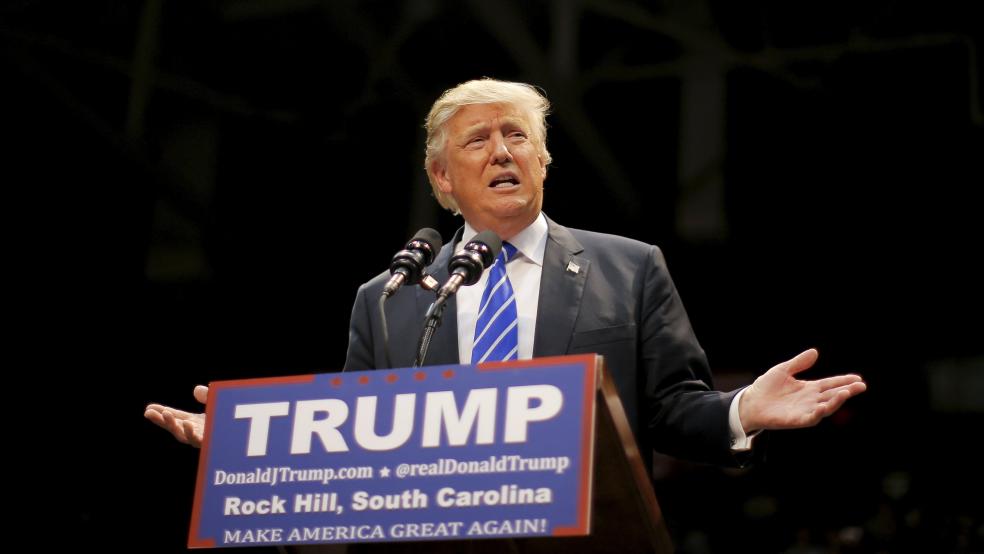When an article in The New York Times last week observed that Donald Trump’s ground game in Iowa was a bit anemic, the campaign immediately went on the attack. Trump supporters said the story misrepresented the campaign’s state of readiness, and banned the reporter who wrote it from a subsequent event in Iowa for good measure.
But the Times’ observation wasn’t unique. Many reporters on the ground in the Hawkeye State have pointed out that compared to his rivals Trump has relatively little campaign infrastructure, which is generally seen as essential to winning there. Unlike most states, where voters simply walk into a voting boot and either flip a switch or fill in a form, Iowa’s caucus system requires people to go to lengthy and sometimes confusing meetings on a weeknight.
Related: Palin Endorses Trump on a Bad Day for Ted Cruz
The conventional wisdom on Iowa is that to get people to plan ahead, show up and caucus requires a dedicated network of volunteers who will cajole, instruct and remind voters of what they have to do.
Trump, plainly, doesn’t have this to the degree that others in the GOP presidential race do. When reporters for the website FiveThirtyEight visited campaign offices in Iowa last week, they came away with a ranking of the campaigns’ relative preparedness. They divided them into five tiers, and when it came time to place Trump in the ranking, decided he needed a special tier all to himself because the two volunteers in the office blocked them from entering.
Reporter Micah Cohen wrote, “Two Trump volunteers wouldn’t even let us into their West Des Moines office, so we can’t really say what’s going on with The Donald. That said, campaigns typically don’t hide flattering information.”
However, while the Trump campaign has publicly insisted that it has the Iowa operation it needs in place, there has been marked change in tone in recent days. On Friday, the campaign released a YouTube video featuring Iowa state campaign co-chair Tana Goertz.
Related: Is It Time for Clinton to Start Lowering Expectations in New Hampshire?
“I’m so excited to talk to you about how easy it is to go out and caucus for Donald Trump,” she says. After advising voters to arrive early and explaining to those who are not already registered as Republicans that they can do so on site, she adds, “The caucuses are a secret ballot. If you can write T-R-U-M-P, you have just caucused for Donald Trump.”
Trying to take some of the mystery out of the process may help a few voters, but it’s not clear that it will be an effective substitute for a broad network of volunteers who, even in the hours right beforehand, are busy working the phones and even knocking on doors to get people to turn out.
The Trump campaign appears to be banking on its own candidate’s star power to fill in the gaps in its ground game. The morning after former Republican vice presidential candidate Sarah Palin endorsed Trump in Ames, Iowa, he was back out on the stump again, this time urging his supporters to turn out for him.
“You have to get out there, you have to bring your friends,” he said. “If you don't feel well, if you have the worst day of your life, it doesn't matter, you got to get out there.”
Related: Trump Gets Love from Evangelicals, Abuse from the Brits
He promised, “If we win here, we're going to run the table.”
A victory in Iowa would, indeed, set Trump up for a very strong showing in the first two primaries – he is leading by a large margin in New Hampshire, which votes a week after Iowa.
However, whether Trump, by sheer force of personality, can drive the turnout he needs in Iowa is a wide open question, and one with many variables. Everything from weather to other unrelated events can affect turnout at the caucuses, but the biggest variable is Trump himself.
There is little precedent for a candidate like Trump, who has enormous reach on social media and seemingly unlimited access to television and radio news programs. When he entered the race last summer, most political commentators wrote him off as a sideshow – a self-promoter who would flame out when he got bored.
Related: Why Hillary Clinton Has a Tenuous Hold on Black Voters
Trump defied those expectations, surging to a lead that he has maintained virtually the entire time he’s been in the race. He has been able to draw huge crowds across the country, and has suffered no lasting damage from uncounted verbal gaffes and widely condemned attacks on minorities.
Any other candidate with Trump’s degree of preparation in Iowa would almost certainly founder. In fact, any other candidate with half the baggage Trump has would have collapsed months ago. But he’s still here, and he carries it lightly. Up to now, Trump has done what most political observers thought was impossible, and that’s why nobody is sure what will happen on February 1.





